THERE was an element of art imitating life – or, more accurately, life imitating art – in the affairs of Gareth Southgate last week.
While the actor Gwilym Lee was at the National Theatre playing Gareth Southgate in a revival of James Graham’s play Dear England, the former England football manager was on the BBC delivering the Richard Dimbleby lecture.
Southgate’s character wears his trademark waistcoat and striped tie in the play, but the garments were conspicuous by their absence when the former manager gave his lecture. And, even more uncannily, the two Southgates talked about the same things – the toxic online culture faced by young men and the England football team’s failure to win a trophy since 1966 because of a proclivity for missing penalties.
The play is a lot more fun – and also much deeper as it deals with how to cope with failure.
Dear England is meant to be “a fictionalised account of the struggles and successes of Engand’s football team”.
Had England actually won a trophy, the play would have been an exercise in triumphalism. That’s why I think a play about the Indian cricket team winning the Champions Trophy in Dubai earlier this month would be pretty dire.
In the play, when Southgate is first appointed football manager in November 2016, he tells the Football Association (FA) chairman Greg Clarke: “I would obviously only be able to manage the team, even for a short time, in the way I would want to do it. And work on the things I think need to be done.”
Clarke asks Southgate, “What do you think needs to be done?” “I think we have a problem,” is Southgate’s initial analysis.
Clarke urges him to be “more specific”. Bit by bit, Southgate tries to explain what he means. He ventures that “something has gone wrong, in England”.
He gets to the heart of the play as he tries haltingly to set out his thoughts: “How we can have all this talent, this history, be the home of the sport, the biggest leagues, and yet... look at us. We’re ‘stuck’. Doesn’t it feel like we’re, like, stuck? Unable to, to – move on, move forward?
“And, and it’s about more than just a series of – setbacks. More than tactics, talent, technique. I think... I think we all have a problem, with what it is to be England, at the moment.
“And, I wish I knew what it was and how to fix it, I do. All I know is I don’t think that sticking plasters will cut it, anymore; it’s about asking some probably, maybe, uncomfortable questions about... almost everything.
“About how we run, and manage, and play, and think about, and feel about... English football, itself.”
Maybe the problem is that too much national pride is invested in the performance of the national football team.
Southgate stepped down as England manager in July 2024 following the UEFA Euro 2024 final defeat to Spain. The Three Lions lost 2-1 in Berlin – their second consecutive Euros final defeat, having been beaten on penalties by Italy at Wembley three years previously.
The manager, then 53, said in his resignation statement: “As a proud Englishman, it has been the honour of my life to play for England and to manage England. It has meant everything to me, and I have given it my all. But it’s time for change, and for a new chapter.”

These are sentiments reproduced in the play.
Meanwhile, in the Dimbleby lecture, Sir Gareth Southgate – as he is now after being knighted in the King’s New Year’s honours list this year for revitalising the England football team – was much clearer about the psychological problems faced by young men.
He spoke about missing the crucial penalty in the 1996 Euros semi-final, when England lost to Germany.
“Missing that penalty was undoubtedly a watershed moment that made me stronger, a better man,” he said. “It forced me to dig deep, and revealed an inner belief and resilience I never knew existed.”
“Too many young men are isolated,” he went on. “Too many feel uncomfortable opening up to friends or family. Many don’t have mentors – teachers, coaches, bosses – who understand how best to push them to grow.
“And so, when they struggle, young men inevitably try to handle whatever situation they find themselves in, alone. “Young men end up withdrawing, reluctant to talk or express their emotions. They spend more time online searching for direction and are falling into unhealthy alternatives like gaming, gambling and pornography.”
Southgate also reflected on what his career has taught him about belief and resilience: “If I’ve learned anything from my life in football, it’s that success is much more than the final score.
“True success is how you respond in the hardest moments.”
The hardest moments in Dear England, which was first performed at the National in June 2023, are being so near and yet so far.
Under director Rupert Goold, the play has been updated to take account of the changes that have occurred. For example, Southgate was then still in charge of the England football team and Rishi Sunak was prime minister.
In their moments of despair, Southgate has to comfort his players – Harry Kane (played by Ryan Whittle); Jordan Pickford (Josh Barrow); Marcus Rashford (Jude Carmichael); Raheem Sterling (Gomba Cole); Harry Maguire (Ryan Donaldson); Eric Dier (Tom Lane); Bukayo Saka (Tone Siah); and Dele Alli (Tristan Waterson).
The psychologist, Pippa Grange, is played by Liz White.
It’s such a shame the black players face extra abuse if the team fails or if they happen to miss a penalty.
There is a point at which Clarke says that “as chairman of the FA, I regret that I wrongly referred to our black and ethnic minority players by an outdated and offensive term (‘coloured’).
“Diverse communities in football that I and others – Gareth Southgate in particular – have worked so hard to include. I am therefore resigning from the FA with immediate effect.”
This is an exciting play even for people who are not that much into football.
The title of the play is taken from the open “Dear England” letter Southgate addressed to fans in the middle of the pandemic on June 8, 2021.

“When you think of the grand scheme of things, perhaps football doesn’t seem so important,” Southgate said. “And what I want to speak about today is much bigger than football.
“There are things I will never understand. Why would you tag someone in on a conversation that is abusive? Why would you choose to insult somebody for something as ridiculous as the colour of their skin? Why? It’s clear to me that we are heading for a much more tolerant and understanding society, and I know our lads will be a big part of that.
“I am confident that young kids of today will grow up baffled by old attitudes and ways of thinking. For many of that younger generation, your notion of Englishness is quite different from my own. I understand that, too. I understand that on this island, we have a desire to protect our values and traditions – as we should – but that shouldn’t come at the expense of introspection and progress.”
Dear England transfers to the Lowry in Salford following its run at the National Theatre until June 29.






 Shefali Jariwala dies at 42 after cardiac arrest, industry mourns Kaanta Laga starInstagram/
Shefali Jariwala dies at 42 after cardiac arrest, industry mourns Kaanta Laga starInstagram/ Shefali Jariwala was married to actor Parag Tyagi,Instagram/
Shefali Jariwala was married to actor Parag Tyagi,Instagram/








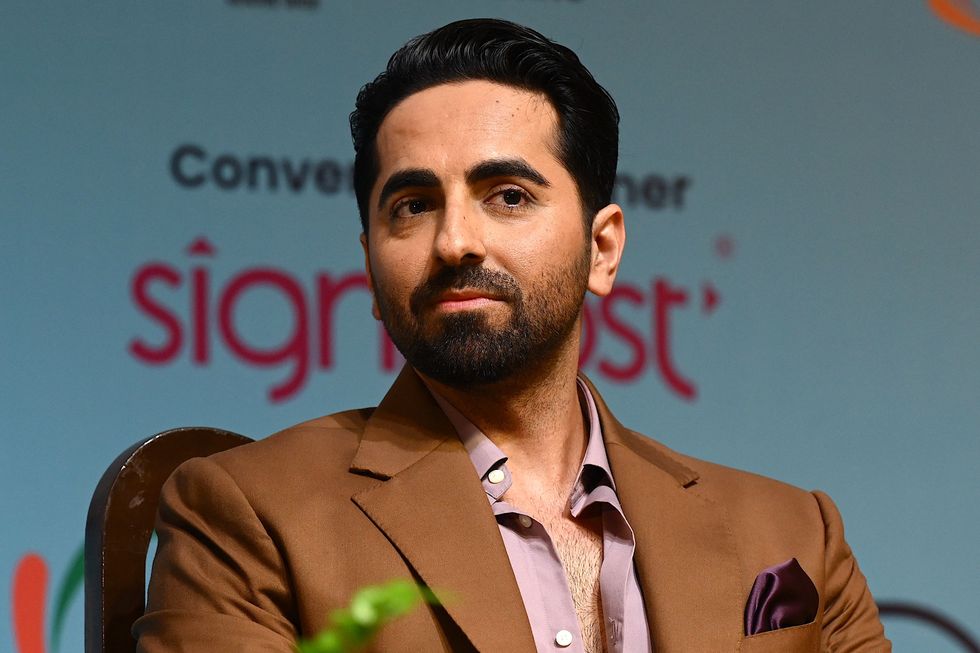 Ayushmann Khurrana attends an event at the FICCI Frames 2024 Getty Images
Ayushmann Khurrana attends an event at the FICCI Frames 2024 Getty Images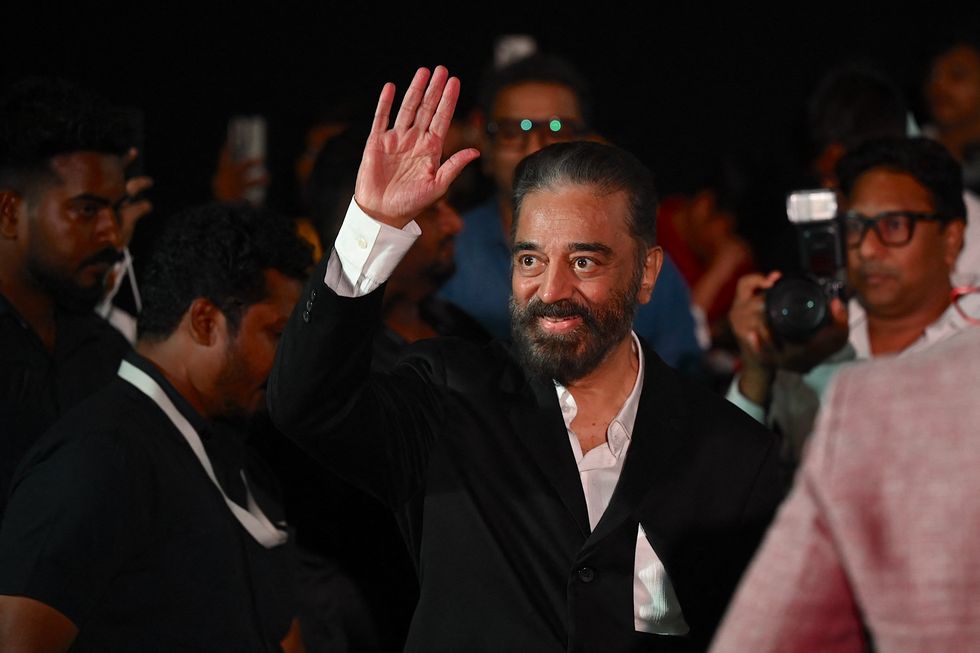 Kamal Haasan waves as he attends a press conference for 'Thug Life'Getty Images
Kamal Haasan waves as he attends a press conference for 'Thug Life'Getty Images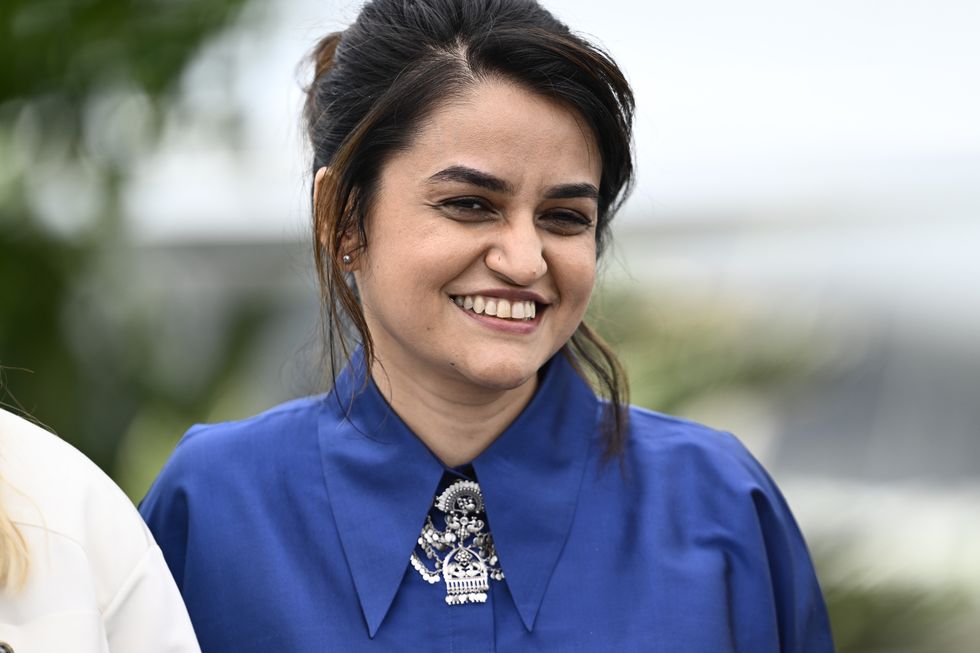 Payal Kapadia smiles during the Jury photocall at the 78th annual Cannes Film FestivalGetty Images
Payal Kapadia smiles during the Jury photocall at the 78th annual Cannes Film FestivalGetty Images
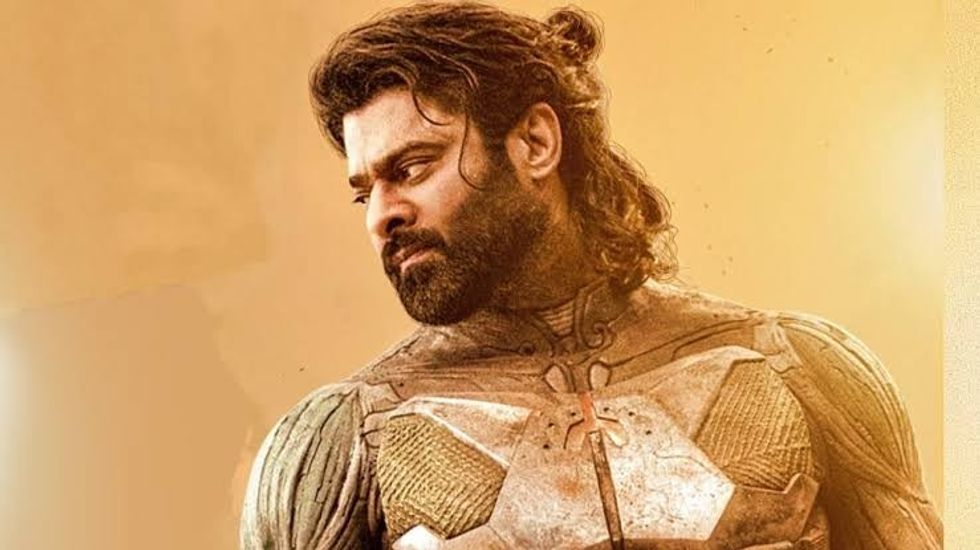 Prabhas in a still from Kalki 2898 AD which completed one yeargetty images
Prabhas in a still from Kalki 2898 AD which completed one yeargetty images Kalki 2898 AD became one of the top three biggest openers in Indian cinemagetty images
Kalki 2898 AD became one of the top three biggest openers in Indian cinemagetty images Kalki 2898 AD brought together sci-fi and mythology in a first-of-its-kind Indian filmgetty images
Kalki 2898 AD brought together sci-fi and mythology in a first-of-its-kind Indian filmgetty images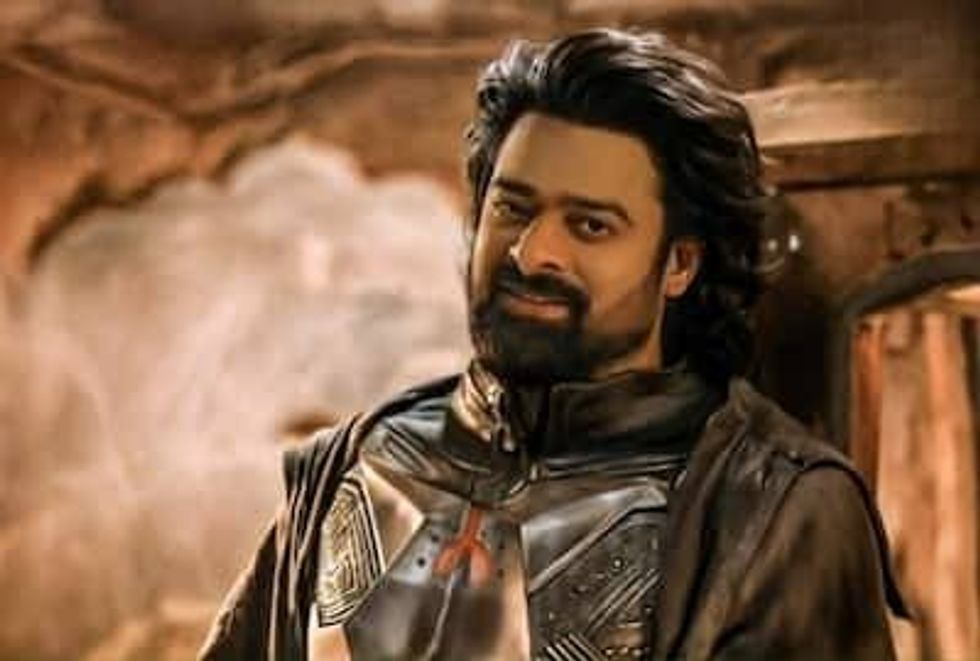 Prabhas plays the futuristic warrior Bhairava in Kalki 2898 AD getty images
Prabhas plays the futuristic warrior Bhairava in Kalki 2898 AD getty images Prabhas in action during a high-intensity sequence from Kalki 2898 ADgetty images
Prabhas in action during a high-intensity sequence from Kalki 2898 ADgetty images
 Anusha Mani
Anusha Mani
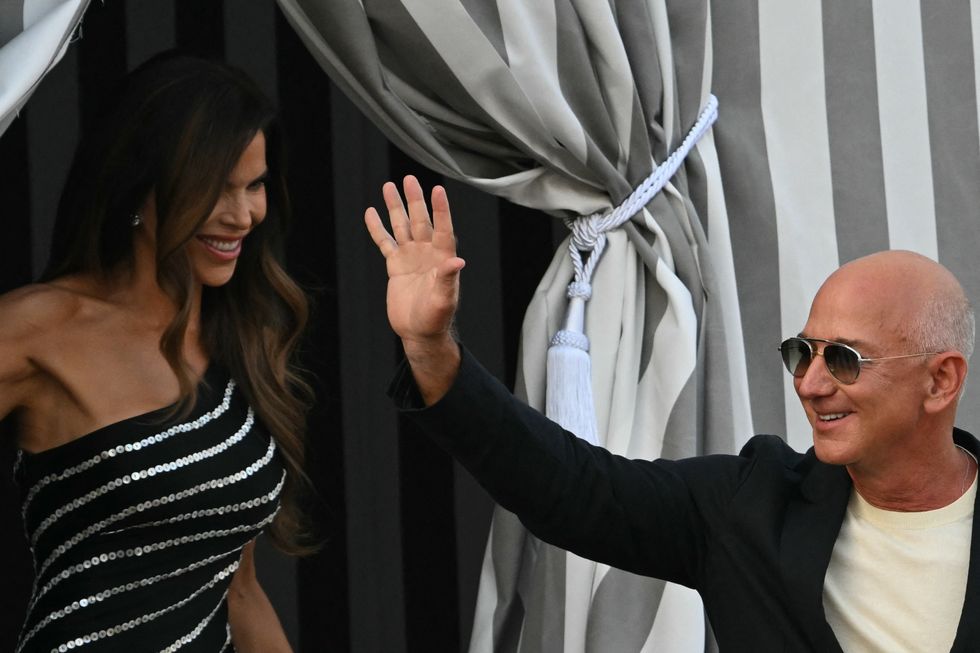 Lauren Sanchez and Jeff Bezos leave the Aman Hotel in Venice ahead of their wedding Getty Images
Lauren Sanchez and Jeff Bezos leave the Aman Hotel in Venice ahead of their wedding Getty Images  Kardashians seen boarding a boat ahead of the evening celebrations in VeniceGetty Images
Kardashians seen boarding a boat ahead of the evening celebrations in VeniceGetty Images 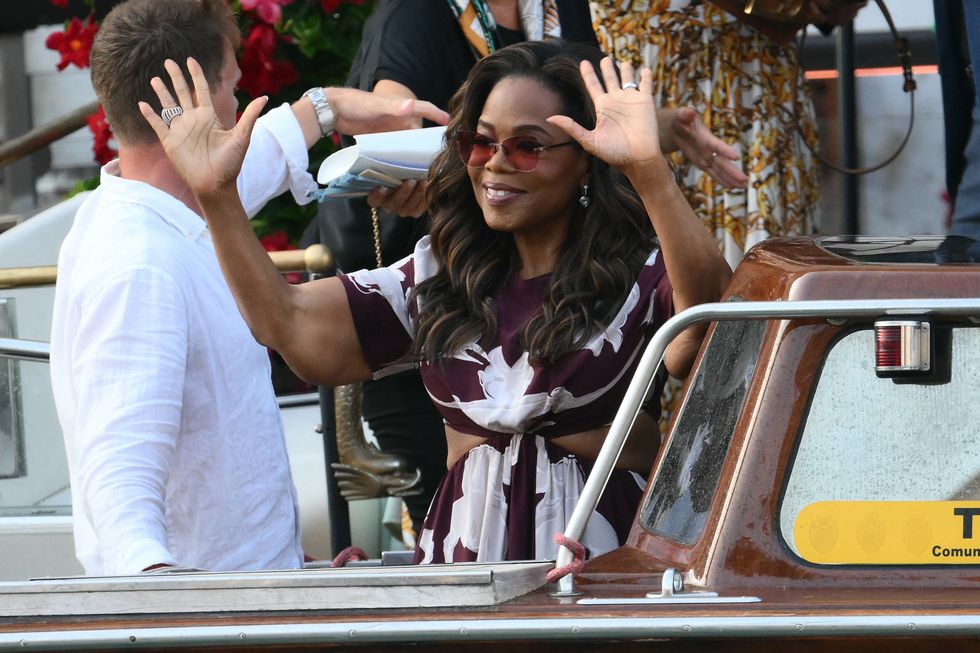 Oprah Winfrey wave to fans while heading to the welcome event Getty Images
Oprah Winfrey wave to fans while heading to the welcome event Getty Images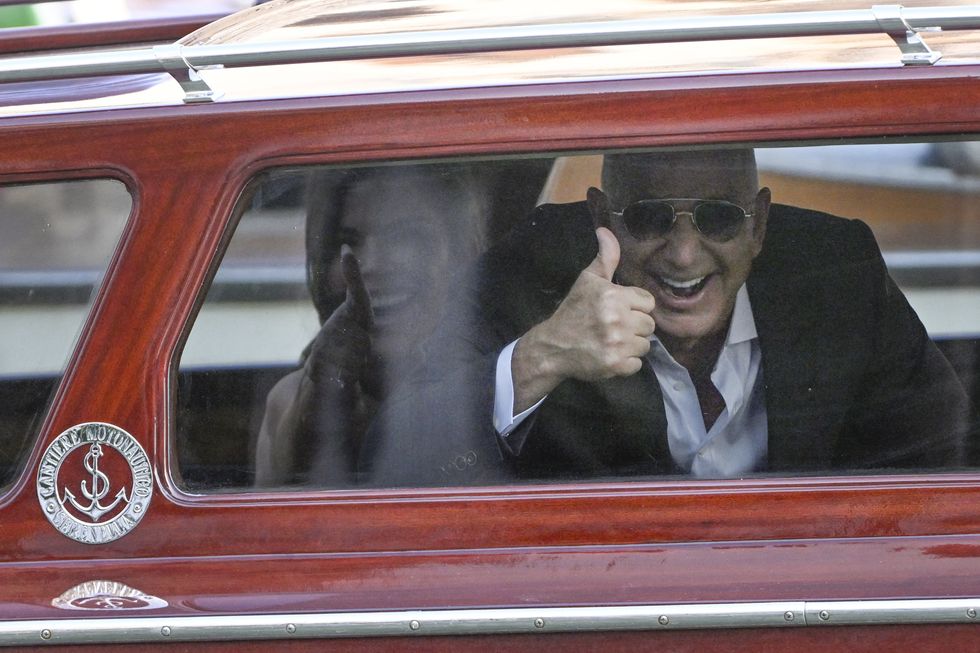 Jeff Bezos and Lauren Sanchez gesture in direction of Bezos' lookalike from the taxi boatGetty Images
Jeff Bezos and Lauren Sanchez gesture in direction of Bezos' lookalike from the taxi boatGetty Images